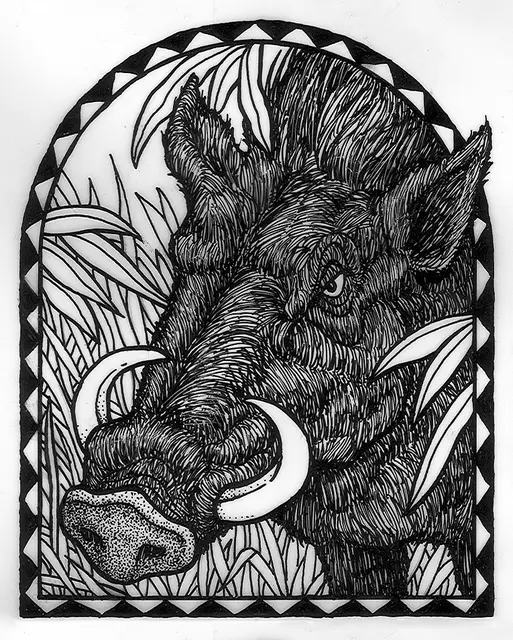Babuen Kuresma: Lenten Boar

Table of Contents
Share This
Boar of punishment
Modern-day Guam is a predominantly Catholic society. Some beliefs have passed through generations preserving the practices of the Lenten Season, one of which is of a mythological boar – the babuen kuresma – that will bite or harm children for infractions committed during the observance of Lent that lasts for forty days.
Lent a time of reflection
During Lent Catholics are supposed to be devout practicing silence, fasting and abstinence in order to reflect of Jesus Christ’s fasting in the desert.
Children are not allowed to play outside and and are told to refrain from making loud noise. An adult is expected to be quiet as well and should be serious, not playing practical jokes or have fun in general. When doing work outside and noise is unavoidable he or she should try keep the volume down as much as possible and minimize frenzied activity and extreme exertion. It is not proper to yell or scream, speak in loud voices, or laugh out loud. It is also improper to play music or sing, except religious verses such as those sung at rosaries or novenas. If a family has a party or a small social gathering, it must be subdued and not be filled with gaiety. All social activities become more rigid during Holy Week, and most especially on Holy Thursday and Good Friday.
If any of these warnings go unheeded, it is seen as gravely disrespectful and the child or adult are threatened that they will be visited by the Lenten hog, which will mercilessly bite and attack the offender. The Lenten hog is to be feared because it is mean and cruel. Some say the hog is a huge, hairy beast, with razor sharp teeth, large hooves, and that it runs very fast. Others say that no words can describe the animal other than it is so scary that they cannot remember the ordeal.
CHamoru Catholic beliefs
The babuen kuresma is a figure in Christian belief but it is in the CHamoru/Chamorro belief system that it gains life. CHamorus have unique animistic beliefs, which animate and attach a collective soul to animals and objects in nature. This enables the babuin kuresma to incite true fear into the hearts of the young Catholic faithful, though belief in the Lenten Boar is less pervasive in contemporary times.
For further reading
Cunningham, Lawrence J., and Janice J. Beaty. A History of Guam. Honolulu: Bess Press, 2001.
Onedera, Peter R. Fafa’ña’gue yan Hinengge Siha (Ghosts and Superstitious Beliefs). Tamuning: St. Anthony School, 1994.
